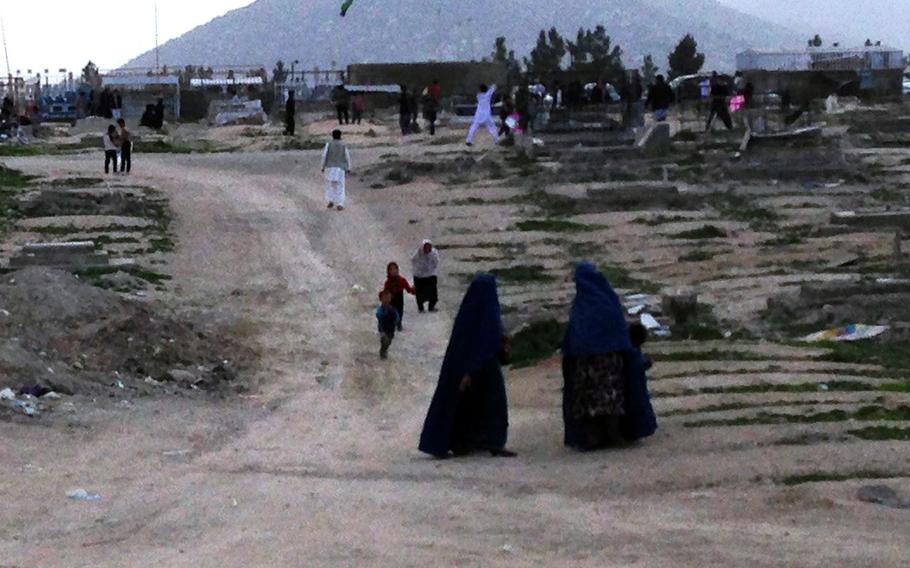
Two women in burqas visit a popular spot for flying kites in Kabul, Afghanistan, on April 15, 2016. Women in Afghanistan have enjoyed more freedom since the Taliban were ousted from power in 2001, but in some conservative corners of the country they still risk "dishonoring" their families if they are seen outside the home. (Phillip Walter Wellman/Stars and Stripes)
KABUL, Afghanistan — A recent pledge by the Afghan Taliban’s new leader to give more rights to women living in areas under the group’s control has been met with skepticism by members of the government, but even some critics see the move as evidence the militants are changing with the times.
When the Taliban ruled Afghanistan from 1996 to 2001, women were denied formal education, forbidden to work and could not leave home without a male chaperone. Today, laws criminalizing harmful traditional practices have been adopted. A record number of women are enrolled in school and university, and female ministers comprise more than a quarter of the Afghan parliament.
But some conservative, rural areas have seen virtually no change in the last 15 years.
Earlier this month, a pregnant 14-year-old girl in Ghor province was burned to death by her in-laws in an alleged “honor killing.” She had been married to settle a family dispute in a tradition known as Baad.
In his first official statement since becoming the Taliban’s leader in May, Haibatullah Akhundzada earlier this month appeared ready to stamp out some of these sexist traditions in areas he holds influence.
“I will try for better reforms of courts and efficient conduct of affairs and for ... the rights of women as per Sharia (Islamic law),” he said in the statement, posted on the Taliban’s website.
When asked by Stars and Stripes about the pledge, Taliban spokesman Zabihullah Mujahid, said the group is tackling a number of issues, including ensuring women are allowed to divorce and receive inheritance.
Kate Clark, a senior analysts with the Afghanistan Analysts Network, cautioned that conceptions of what constitute women’s rights “can be very different.”
“The Taliban have always talked about women’s rights but often in their own terms within an Islamic discourse.”
According to the Special Inspector General for Afghanistan Reconstruction, the Taliban control more territory now than at any time since the 2001 U.S.-led invasion ousted them from power. But Clark said that the group remained fragmented and that local commanders could easily ignore orders to protect women.
Last summer a group of about a dozen Afghan women held unprecedented talks with the Taliban in Oslo, Norway, aimed at ensuring the rights gained by women are not forfeited in any future power-sharing deal with the government. The meeting was held a month after Taliban representatives pledged a softer stance on women during exploratory talks with Afghan government officials in Qatar.
According to participants, the Taliban representatives said they would support women’s rights to education, work, inheritance, choice of their own husbands and participation in politics. A year later, the group appears to be standing by many of these pledges, at least officially.
But Sima Samar, chairwoman of the Afghanistan Independent Human Rights Commission, remains wary. “Now that they’re not in power, they might be softer in their actions, but there’s no guarantee,” she said.
And actions may speak louder than words.
Last year when the Taliban briefly took control of the northern city of Kunduz, they looted offices of women activists, shelters and women-run radio stations. As a result, dozens of activists fled the city, Human Rights Watch reported.
Still, it is generally agreed that the Taliban have softened their stance on women’s education, and they seem to be playing down past efforts to prevent women from studying.
“We are not against educations for women ... we signed a protocol with the U.N. at the time (of Taliban rule) to provide separate schools and transportation for girls if the U.N. funded it, but they didn’t fund us so we could not provide the facilities,” Mujahid said.
Clark said the militants actively prevent girls from going to school, but she said the behavior was also revealing.
“I think they have been forced by changing public opinions to change their stance on education,” she said. “People definitely want their boys to go to school, and a lot of them want their girls to go to school. And I think the Taliban have responded to that demand by changing their views.”
Afghan parliamentarian Shinkai Karokhail insisted the Taliban would lose supporters if they did not adapt to new perceptions of women.
“They have to change their attitudes; they have to change their policies,” she said. Regardless of whether new leader Akhundzada’s recent statement was sincere, the fact that he mentioned women’s rights, Karokhail said, shows the issue is more important to Afghans than it was in the recent past.
“What I would say is that we should not really generalize that the Taliban have changed their mentality,” said Samar, chairwoman of the Independent Human Rights Commission. “I think the behavior that we see in some areas they control is not very positive.” But she believed there was room for optimism.
“There’s no doubt the situation for women is improving across Afghanistan,” she said, “and we cannot also ignore that humans, even the Taliban, are changeable.”
Zubair Babakarkhail contributed to this report.